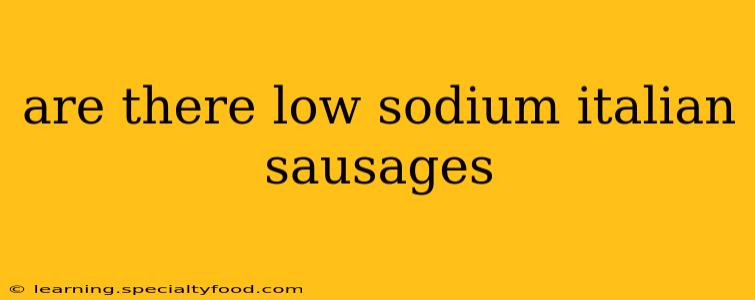Are There Low-Sodium Italian Sausages? Navigating the Grocery Aisle for Healthier Options
Finding low-sodium Italian sausages can feel like a quest, but it's definitely achievable! Many people are looking for ways to reduce their sodium intake, and that includes enjoying their favorite foods in a healthier way. Let's explore the options and address some common questions.
What are the sodium levels in regular Italian sausages?
Regular Italian sausages typically pack a hefty sodium punch. The exact amount varies greatly depending on the brand and specific recipe, but you can generally expect a serving (often around 1 sausage) to contain anywhere from 300 to 600 milligrams of sodium or more. That's a significant portion of the recommended daily intake of sodium, which is generally capped at 2,300 milligrams, or even lower for individuals with certain health conditions.
Where can I find low-sodium Italian sausages?
The good news is that several brands now offer low-sodium or reduced-sodium varieties of Italian sausage. Your best bet is to check the following locations:
- Major grocery stores: Larger supermarket chains often carry a wider selection of specialty and health-conscious food items, including reduced-sodium sausages. Look in the meat section, often near other "healthier" options.
- Health food stores: Stores specializing in natural and organic foods are likely to have a selection of lower-sodium Italian sausages from various brands that focus on health-conscious ingredients.
- Specialty butchers: Some local butcher shops may be willing to make low-sodium sausages to order, using lean meats and less salt. This is a great option if you're looking for a truly customized product.
H2: What are the benefits of choosing low-sodium Italian sausage?
Reducing your sodium intake offers numerous health advantages. Lowering sodium consumption can help:
- Lower blood pressure: High sodium intake is a major contributor to high blood pressure, a significant risk factor for heart disease and stroke.
- Reduce water retention: Excess sodium can cause the body to retain water, leading to bloating and swelling.
- Improve heart health: Reducing sodium is crucial for maintaining cardiovascular health and reducing the risk of heart-related problems.
- Improve kidney health: The kidneys work hard to process sodium, and reducing intake can lessen the strain on these organs.
H2: Are low-sodium Italian sausages just as flavorful?
While the lower sodium content might lead to some initial concerns about flavor, many brands compensate by using other flavor enhancers. They may incorporate more herbs, spices, and garlic to create a rich and satisfying taste experience without relying heavily on salt. It's important to read reviews and try a few different brands to find one you enjoy.
H2: How can I make my own low-sodium Italian sausage?
Making your own Italian sausage at home offers complete control over the sodium content and ingredients. You can find numerous recipes online that guide you through the process, often utilizing leaner meats and substituting salt with herbs, spices, and other flavorings. This gives you the flexibility to create a sausage that perfectly suits your palate and health goals.
H2: Are there other ways to reduce sodium in my diet?
Beyond sausages, there are many other ways to reduce your overall sodium intake. These include:
- Reading food labels carefully: Pay close attention to the sodium content listed on packaged foods.
- Choosing fresh produce and whole grains: These foods are generally lower in sodium than processed options.
- Limiting processed foods: Many processed foods are high in sodium.
- Using herbs and spices to enhance flavor: Instead of salt, experiment with various herbs and spices to add flavor to your dishes.
- Cooking more meals at home: This allows you to control the amount of salt used.
In conclusion, finding and enjoying low-sodium Italian sausages is entirely possible. By exploring different brands, making your own, and adopting broader dietary changes, you can savor your favorite Italian flavors while prioritizing your health and well-being. Remember to always check nutrition labels carefully before making your purchase.
